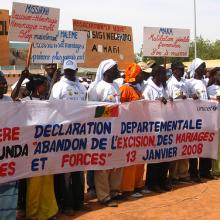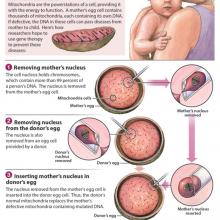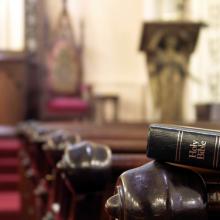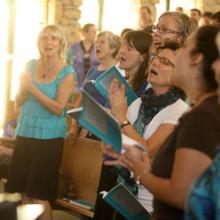Religion
Editor's Note: Sojourners has launched this new blog series to help shed light on the nation's latest "religious" affiliation. Go HERE to read their stories. Or EMAIL US to share your own.
PBS Religion & Ethics Newsweekly has wrapped up its three-part new mini-series on the rise of the unaffiliated. Go HERE to read more about this week's episode.
Watch None of the Above: Religious Implications on PBS. See more from Religion & Ethics NewsWeekly.
SPOKANE, Wash. -- They stood in front of a shopping mall, shackled together, heads down, nameplates dangling around their necks, bearing the names of men and women who have died on America’s death row.
Cal Brown.
Teresa Lewis.
Cameron Todd Willingham.
Behind them, stood Victoria Ann Thorpe, dark makeup painted on her cheeks and a sign painted to look like blood stains waving above her head: “Their blood is on our hands.”
Somehow, despite Thorpe’s gory exterior, she’s approachable.
“Would you like information on the death penalty?” she asks shoppers as they exit the mall, unable to avert their eyes from the scene in front of them. She hands them a clipboard and one by one, they fill out postcards showing their support to abolish the death penalty in Washington. The cards will later be sent to state lawmakers. The group has also protested at Gonzaga University and so far has collected more than 200 signatures.
Thorpe, along with the Safe and Just Alternatives organization and The Inland Northwest Death Penalty Abolition Group, is seeking to pass a state law to replace the death penalty in Washington state with life without parole.
BOSTON -- The one thing that Afrah Farah will tell you about her genital cutting experience is that it happened. She doesn’t want to say how old she was, where it happened, or who was or wasn't with her.
Yet, despite the painful memories that the experience evokes and her concerns about people's reactions, Farah, said she knows she has to speak out.
“It’s basically a traumatizing experience. It’s traumatizing for every young girl that goes through that. It’s something that sticks in your memory, and physically,” said Farah, a Somali immigrant who came to the Boston area by way of Kuwait and Germany in 2007, and now works as a drug developer in a Massachusetts laboratory.
“There are millions of people who are affiliated with this procedure -- parents, grandparents, people in the community -- and to label them all as bad people or barbaric, that’s wrong. You will push them away. To solve a problem like this, you need to approach people with respect.”
Because of its severity and prevalence, female genital mutilation (FGM, or "cutting") is arguably one of the most important human rights issues in the world. It’s also become increasingly important in the U.S. as the number of immigrants from countries where it is practiced grows.
With their “True Love Waits” jewelry, conferences and T-shirts, Christians may be the face of the abstinence movement, but Muslims and Hindus are more likely to abstain from premarital sex.
That's the conclusion of a new study in the American Sociological Review, which also found that Muslims and Hindus -- at least in the developing world -- are more likely than Christians and Jews to refrain from extramarital sex.
“All major world religions discourage sex outside of marriage, but they are not all equally effective in shaping behavior,” said Amy Adamczyk of the John Jay College of Criminal Justice, who co-authored the study with John Jay doctoral student Brittany E. Hayes.
Drawing on the Demographic and Health Surveys funded by the U.S. Agency for International Development, the study included data from 31 developing nations collected between 2000 and 2008. The authors focused on individuals' responses to questions on religious affiliation, marital status, and sexual behavior outside of marriage.
Adamczyk said the study evolved from another study she was doing that found countries with large Muslim populations have very low rates of HIV and AIDS. "I was trying to figure out why that would be,” she said. One reason she considered was lower rates of sex outside of marriage.
PORTLAND, Ore. – Future generations could be stripped of mutations such as hereditary blindness or maternal diabetes, after a breakthrough study at Oregon Health & Science University.
But the new technique is also one short step from genetic design of future generations, said Marcy Darnovksy of the California-based Center for Genetics and Society. "These powerful new technologies have a whole bunch of wonderful and appropriate uses – and a number of ways they can be misused.
The researchers, led by OHSU biologist Shoukhrat Mitalipov, modified unfertilized eggs for the first time, a technique that offers great promise as well as ethical pitfalls. Such research is banned in many countries.
Three years ago, the Russian-born Mitalipov made headlines with experiments that created monkeys with genetic material from three parents. Now, his team has done it with human cells, setting the stage for possible experiments with humans.
The procedure dealt with what's called mitochondrial DNA, the small part of the cell that turns food into energy. Mitochondrial disorders can lead to neuropathy (a type of dementia) and nervous system disorders such as Leigh disease.
In a study published Wednesday in the journal Nature, the OHSU team described successfully transferring DNA from donor cells into other donor cells, fertilizing the eggs to create 13 tiny early embryos of roughly 100 cells each. These pre-embryos, called blastocysts, were converted to embryonic stem cells for future research.
Key to the technique: replacing the defective mitochondrial DNA with healthy genetic material from the egg of a second woman.
Editor's Note: This is part three of a three-part series from Dr. Miroslav Volf an a voice instructing us how to involve our values into our present politcal debates. To read part one go HERE and part two HERE.. From part one:
In this year of presidential elections, I have decided to summarize key values that guide me as I decide for whom to cast my vote. ...
14. Equality of Nations
Value: No nation represents an exception to the requirements of justice that should govern relations between nations. America should exert its unique international power by doing what is just and should pursue its own interests in concert with other nations of the world.
Rationale: “In everything do to others as you would have them do to you; for this is the law and the prophets” (Matt. 7:12).
Debate: The debate should not be whether America is somehow exceptional (and therefore permitted to do what other nations are not—for instance, carrying out raids on foreign soil in search of terrorists). The debate should, rather, be about what it means for the one remaining superpower to act responsibly in the community of nations.
Question to Ask: At the international level, would the candidate renounce a double moral standard: one for the U.S. and its allies and another for the rest of the world? Even when the candidate considers an American perspective morally superior, will he seek to persuade other nations of the moral rightness of these values rather than imposing them on other nations?
Editor's Note: Sojourners has launched this new blog series to help shed light on the nation's latest "religious" affiliation. Go HERE to read their stories. Or EMAIL US to share your own.
PBS Religion & Ethics Newsweekly has launched a new mini-series on the rise of the unaffiliated. Go HERE to read more about this week's epidsode.
Watch None of the Above: Political Implications on PBS. See more from Religion & Ethics NewsWeekly.
Art and iconography — both ancient and modern — from Ethiopian Orthodoxy (also known as Tawahedo or "being made one" in the Ge'ez language that remains the official language of the Orthodox liturgy here) were ever-present — in shops, restaurants, and hotel lobbies as well as in the myriad churches and monasteries, and the sounds of ancient Christian prayers and the chants of monks filled the air from the capital city of Addis Ababa to the kebeles (or neighborhoods) on the outskirts of Bahir Dar, another major city about 60 km from the Sudanese border.
Were I one for object lessons I’d have brought a nice sharp axe with me into the pulpit today. Because it’s only once in awhile that we get to hear Jesus talk about brutal self-mutilation as a sign of discipleship.
Growing up I was terrified of those verses in Mark’s Gospel that we just heard – the ones where Jesus suggests that if your hand causes you to sin cut it off, and if your foot causes you to sin hack that off too, and if your eye causes you to sin gauge the sucker out. I remember the summer I was 11 years old when I stole candy from KMart and then hid it in the heat duct in my room. And I remember hearing this passage soon after that and thinking how my hand had indeed caused me to sin. And then and there I decided to never steal again lest Jesus insist I hack off my own limbs.
The problem, of course, is that my hand has never caused a darn thing. My eye doesn’t cause me to sin. My foot can’t be held accountable for my missteps. If you want to find the culprit behind my sin don’t look at my hand. Look at my heart. My poor feet just do what they’re told.

Editor's Note: Megan Monaghan Rivas tells her story of why she's part of the 20 percent of Americans who identify with "no religion in particular." Find more stories (or share your own) HERE. Read about the study HERE.
There are never really two kinds of people in the world. But for purposes of this post, I’ll posit that there are two kinds of “nones” in the world – “nones” who would be part of a church if they could just find the right one, and “nones” who have no desire to be part of a church even if it matched them perfectly. I place myself in the latter category.
Like many “nones,” I started out as a “some.” I was reared in the Roman Catholic Church and educated in Catholic schools. As luck and the development curve would have it, just after confirmation (at age 14) I started finding out things about the church that I could not stand up and be counted for. The church’s policies concerning women and homosexuals seemed to me to stand in deliberate polar opposition to the Gospel message. And the church is not known for willingness to change from the inside. I didn’t have another 2,000 years to wait. My first “adult” move in the church was to leave it.
PBS Religion & Ethics Newsweekly has launched a new mini-series on the rise of the unaffiliated. Go HERE to learn more.
Watch None of the Above: Who Are They? on PBS. See more from Religion & Ethics NewsWeekly.
NEW DELHI — Political leaders in the tiny Buddhist nation of Bhutan have announced a nearly six-month ban on all public religious activities ahead of the upcoming elections, citing the Himalayan nation's constitution that says “religion shall remain above politics.”
A notification by the Election Commission of Bhutan asks people's "prayers and blessings" for the second parliamentary election, expected in June 2013. But it also states that religious institutions and clergy "shall not hold, conduct, organize or host" any public activity from Jan. 1 until the election.
The ban comes a year after the country's religious affairs ministry identified Buddhist and Hindu clergy who should be barred from voting to keep a clear distinction between religion and politics.
[The "nones"] recite history and Christian leadership's collusion with the agents of empire-building and warfare. Then they say something like, “I'd rather live like Jesus than be a Christian.”
They see the Church as the rich young man and they wonder if anyone actually follows Jesus anymore.
Of course, this is not the only demographic shift at work in the religious life of the world.
There are more Anglicans in Nigeria than there are in England.
More Presbyterians in Ghana than in Scotland. ..
More Baptists in Southeast Asia than in the Southeastern United States.
More Christians go to church in China than in Europe.
In 1900, 71 percent of the world's Christians were in Western Europe. By 2000 that percentage dropped below twenty percent in some European nations.
Here's the real kicker: these are not problems to fix. They are simply realities to be faced.
OK, church folks. Fasten your seat belts. But don’t hunker down.
There’s a new study out this week that shows that one-in-five Americans has no religious affiliation. Not Baptist, not Catholic, not Lutheran, not Jewish, not Muslim.
For those of us in the world of organized religion, this just adds more data to a trend we have seen accelerating over the last decade.
In 2007, about 15 percent of the adult population in the U.S. described itself as unaffiliated with any religion. In a comparable survey done this summer and released on Tuesday by the Pew Research Center’s Forum on Religion and Public Life, the number hit 20 percent. And if you just focus on those under 30, the religiously unaffiliated constitute one third of that group.
Among those of us who are professional religious types, this is the kind of data that can prompt a lot of gloomy introspection about relevance and a lot of finger pointing at those who are not interested in the same kinds of religious expression that we are.
Let me suggest there’s a less gloomy and less judgmental way to think about this data.

Editor's Note: Melissa Otterbein tells her story of why she's part of the 20 percent of Americans who identify with "no religion in particular."Find more stories (or share your own) HERE. Read about the study HERE.
A "recovering Evangelical," author Melissa identifies with the "nones" after church experiences in the non-denominational Church, Lutheran Church, Church of God, United Church of Christ, and the kind of Church that happens when you have hour-long conversations with people who are materially poor yet rich in spirit. Each of these "Churches" (and those not mentioned) depict Christ in beautiful ways, she believes, but feels that solely identifying with a denominational designation hasn't seemed to fully capture her faith experience. Though "none" might seem like a shocking response to "which religious tradition do you closely identify with?" it's one that, "offers freedom in Christ that brings me to closer to the Kingdom of God in the here and now."
I am tired of explaining away my faith.
I am tired of defending, “proving,” withholding my true feelings for fear of religious retaliation.
I’m tired of watching some people argue their faith, trying to “win people to Christ” with their cogent, convincing “answers.”
I’m tired of watching Jesus be sold, marketed, put on display.
I’m tired of watching certain people try to convince the world why their God is the right God.
I’m tired of listening to people deify their Bible by retorting this verse and that verse when our God is so much bigger than the sole medium of Genesis-Revelation.
I’m tired of platitudes about the Word and faith and sin and grace that I’ve heard over and over again; for every time I hear these trite remarks, I question if we’ve lost the unadulterated beauty behind such venerable passages.
Editor's Note: Sojourners has launched this new blog series to help shed light on the nation's latest "religious" affiliation. Scroll down to read their stories. Or EMAIL US to share your own.
Which religious tradition do you most closely identify with?
- Protestant
- Catholic
- Mormon
- Muslim
- Jewish
- Orthodox
- Other Faith
- Unaffiliated
Given these options — or even if you throw in a few more like Buddhist, Hindu, Agnostic — I would choose “Unaffiliated.” That puts me into a category with one-in-five other Americans, and one-in-three millennials, aptly named the “nones.”
In that vein, I introduce our new blog series: Meet the Nones. Through this series, I hope to encourage discussion, debate, and elucidate the full picture of what it means to be losing your religion in America.
Editor's Note: Would you like to share your story on this topic? Email us HERE.
One-in-five adults in the United States — and a third of adults under 30 — say they have no religious affiliation. The numbers are out in a new report called “’Nones’ on the Rise,” put out by the Pew Forum on Religion and Public Life. That 20 percent of the population is up from 15 percent just five years ago.
But while our church membership rolls may be shrinking, “unaffiliated doesn’t necessarily mean wholly secular,” said senior researcher Cary Funk at the Religion Newswriters Association Conference in Bethesda, Md., on Saturday.
In fact, two-thirds of the 46 million Americans self-identifying as having no religion also say they believe in God. And 21 percent of them say they pray every day. A large portion of this group — 37 percent — say they consider themselves “spiritual but not religious.”
The increase in disaffiliation goes hand-in-hand with an overall lack of trust in American institutions across the board, from the government to the news media, and now, to our houses of worship.
The “nones” overwhelmingly say religious institutions are too concerned with money and power, and 67 percent say they both focus too much on rules and are too involved in politics.
For Nathan De Lee, going to church as a kid was an ordeal.
De Lee, a Unitarian Universalist, grew up in rural Kansas, where members of his faith were few and far between. Attending services meant an overnight trip to Kansas City, Mo., where the nearest Unitarian Universalist congregation was.
Today, getting to church is easy for De Lee, an astronomer at Vanderbilt University. He's a regular in the choir on Sundays at First Unitarian Universalist Church in Nashville, which has a congregation of about 500.
De Lee is one of a growing number of Unitarian Universalists, a group of people who believe in organized religion but are skeptical about doctrine. The denomination grew nationally by 15.8 percent from 2000 to 2010, according to the Association of Statisticians of American Religious Bodies.
WASHINGTON — Most Americans do not believe Scientology is a real religion, according to a recent poll by 60 Minutes and Vanity Fair.
The survey, conducted by CBS News, found that 70 percent of Americans say that Scientology is not a true religion; 13 percent believe it is; and 18 percent either don’t know or don’t care.
Out of the more than 1,000 people polled, Christian Americans were even more likely to question Scientology’s status as a religion — 79 percent of evangelicals, 74 percent of Protestants and 72 percent of Catholics surveyed responded that they did not think Scientology is a religion.
L. Ron Hubbard, a science fiction author, established Scientology in 1952, and the Church of Scientology has been acknowledged as a religion in the United States since 1993. Scientology is known for its celebrity followers, such as actors Tom Cruise and John Travolta.














